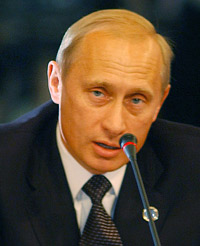Last week Moscow proved once again the importance of Moscow-CIS countries relations and it turned out that they are not that important. Vladimir Putin rejected the invitation to meet with Ukrainian president Victor Yushchenko. The meeting has been postponed for an unknown reason and the reason was clarified later.
The Kremlin was mad at Yushchenko for commissioning his candidate for Minister of Foreign Affairs Vladimir Ogrizko to Moscow to sign the “Russia-Ukraine 2007-2008” convention when the Ukrainian parliament still had not confirmed Ogrizko as minister. The Kremlin noticed Yushchenko’s contemptuous behavior and thus decided to “put him in his place” by rejecting the meeting.
Alexander Lukashenko was not that lucky either. He was spending his vacation in Sochi and was waiting for the call from the Kremlin. Nobody called him and it seems as though he has already returned to Minsk.
President of Kazakhstan Nursultan Nazarbayev was also rejected by Putin. The official motive for the rejection was that the president had caught a cold. The Kazakh president made it to the Kremlin only after the second attempt. The meeting was unsuccessful. Putin postponed the signing of the treaty on creating a joint center for uranium enrichment and simply accepted Nazarbayev’s new proposals for integration as information. This is evidently Russia’s response to Kazakhstan’s active participation in the energetic projects in which Russia has not been invited.
During his speech on the Government Hour at the Russian Duma, Russian Foreign Minister Sergey Lavrov blamed the CIS countries for the current situation of the Russian-CIS countries’ relations. He argued that the CIS was not able to become a non-absolute integrative union, a non-effective international organization because some of the CIS countries don’t accept the super-national character of their activities.
“The people that came to power in some of those countries declared that they had a multifaceted approach to international issues, did not observe Russia as the principal, supreme course for their foreign relations and respectively came up with their own policies,” announced the minister.
Lavrov is right, but partially because now, Russia is no longer showing constructiveness in relations with CIS countries. Russia is sick and tired of some of the countries’ obstinacies, the consumer-driven attitude of the others, the extreme independence of the third group of countries and almost inimical attitude of the rest. Russia feels that it is rather strong in order to hold talks with powerful, foreign powers equally. It is clear that Russia has remembered the early ‘90s when it needed the CIS in order to prove that it had accomplishments on the international political stage. Russia had nothing else at the time, but the former “fraternal republics” of the USSR, instead of helping Russia, were going against its interests and did not even fear to threaten that they would leave the CIS at any given time.
Ukraine and Turkmenistan did not sign the CIS charter; Georgia, Armenia and Moldova were playing their games by using Russia’s domestic markets to sell their products. Uzbekistan needed the events that took place in Andijan so that it could fall back in the hands of Moscow; Byelorussia, Armenia, Tajikistan and Kyrgyzstan have their own interests for staying in the CIS and currently, it appears that the CIS is much more vital for its member countries than Russia. That is why Moscow no longer rejects the proposals for new integration schemes made by Astana and sometimes by Minsk, but it doesn’t support them either. It doesn’t need to.

